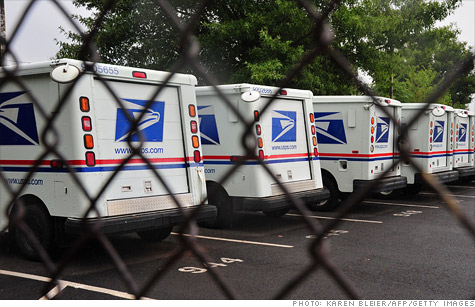Search News

The Postal Service retracted and redid a survey that showed postal closings and cutbacks would result in $5.2 billion in lost business.
WASHINGTON (CNNMoney) -- Unions and some lawmakers say the U.S. Postal Service's plans to close plants and post offices would turn customers away and hasten the service's downward spiral.
Now their campaign has been buoyed by revelations of a survey that the Postal Service commissioned -- and then dismissed and pushed to make secret. The survey, budgeted to cost up to $435,000, shows closures and cutbacks would cost $5.2 billion in lost business and result in a 7.7% drop in mail volume.
The Postal Service says the survey -- conducted last summer -- was "seriously flawed" because it was based on the assumption that slower delivery, an end to Saturday service and postage price hikes would all happen at the same time. The proposed cutbacks would occur over five years, according to the service.
As a result, the Postal Service ordered a new survey focused on tracking customer response to slower delivery and plant closures. It showed the Postal Service losing $1.3 billion in revenue. with a 1.7% drop in total mail volume.
The Postal Service contracted to spend as much as $249,000 to redo the "flawed" survey, according to a contract with Princeton, N.J.-based survey company Opinion Research Corporation filed with the postal regulator. The total tab for the two surveys and other research could reach $961,000. The Postal Service declined to provide actual costs for the surveys.
Sen. Susan Collins, a Maine Republican, said the studies show postal closures threaten to drive customers away.
"Slower delivery and less service will force many customers to pursue delivery alternatives, dealing yet another blow to postal revenues," Collins said in a statement.
Collins is hearing from companies switching to alternatives when the Postal Service closes a mail processing plant in Maine. Her office provided CNNMoney a copy of an e-mail from a company to its employees discussing ways to avoid using the service.
Unions and lawmakers say they're suspicious of the Postal Service's motives in scrubbing the initial survey. They're especially concerned that the service went to such lengths to keep the first survey a secret, asking the Postal Regulatory Commission to seal those results.
The Postal Service asked its regulators to keep the market survey secret, saying it was incomplete and contained sensitive details that could help competitors, such as UPS (UPS, Fortune 500) and FedEx (FDX, Fortune 500).
"Clearly, the results of the initial study didn't match the USPS narrative that slashing services would have little or no impact on revenue," said James Walkinshaw, chief of staff for Rep. Gerald E. Connolly, a Virginia Democrat who was integral in getting the the August survey made public.
Postal Service expert Steve Hutkins -- a New York University professor opposed to service cuts -- has chronicled the botched survey on his blog Save the Post Office.
Before news of the first survey came out, Hutkins came to the conclusion that the Postal Service has low-balled estimates on the costs of closing postal plants and offices.
"It's a very big deal," Hutkins said of the survey. "The survey is much more dramatic proof of the revenue drop we might get."
The recession, declining volume in the type of mail that most Americans use and a congressional mandate to prefund retirement health care benefits have put the service in a bind. The service reported a $5.1 billion loss for the year ended Sept. 30.
The Postal Service is pushing for closure of some 223 plants, which the agency says will save $2.1 billion. Congress faces a deadline of May 15, the end of a Postal Service moratorium on closing facilities.
The unions scored a win last week when the Senate failed to muster enough votes to start tackling the postal legislation. The survey probably didn't play a role in the vote to delay the bill, but it could factor into policy discussions, postal policy experts say.
The unions oppose bills in the Senate and House, saying they fail to create a lasting business model for the Postal Service.
"All they have are plans to dismantle the Postal Service," said Fredric V. Rolando, president of the National Association of Letter Carriers, which represents 280,000 postal workers.
The U.S. Postal Service is, by law, an "independent establishment" of the executive branch. The agency doesn't normally use tax dollars for operations, but it has a $12 billion loan from Treasury, as of Feb. 29. ![]()
| Overnight Avg Rate | Latest | Change | Last Week |
|---|---|---|---|
| 30 yr fixed | 3.80% | 3.88% | |
| 15 yr fixed | 3.20% | 3.23% | |
| 5/1 ARM | 3.84% | 3.88% | |
| 30 yr refi | 3.82% | 3.93% | |
| 15 yr refi | 3.20% | 3.23% |
Today's featured rates:
| Latest Report | Next Update |
|---|---|
| Home prices | Aug 28 |
| Consumer confidence | Aug 28 |
| GDP | Aug 29 |
| Manufacturing (ISM) | Sept 4 |
| Jobs | Sept 7 |
| Inflation (CPI) | Sept 14 |
| Retail sales | Sept 14 |